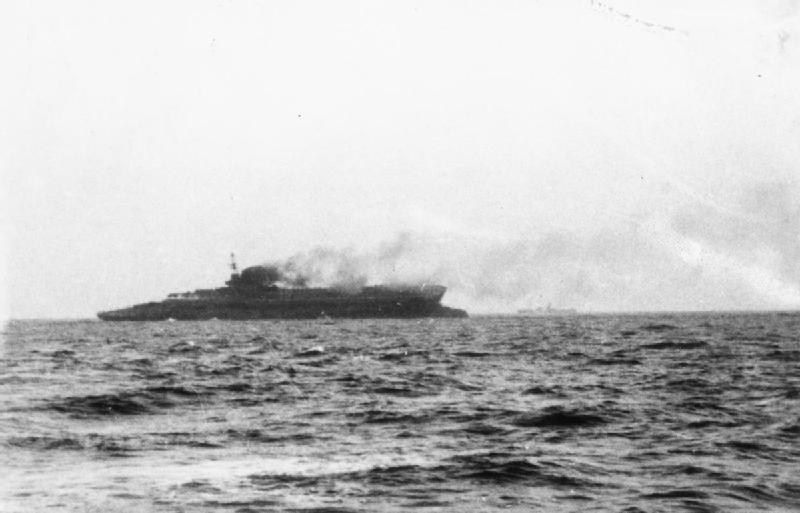Almost immediately after World War II started, Hitler continued where the Kaiserliche Marine left off in World War I. U-Boats (German submarines (Unterseeboot)) began their attack on the Allied shipping lanes, sinking transport after transport. The goal was to prevent the Allies from supplying their armies all over Europe. In the beginning, the Allied (mostly British) shipping was unorganized and made easy targets for the marauding U-Boats. Tactics to combat the U-Boats were premature, ineffective, and proved costly with the loss of the HMS Courageous, a British aircraft carrier. Further embarrassment for the Royal Navy came in December of 1939 when U-47, captained by Gunther Prien, slipped into Scapa Flow (the Royal Navy's home base) and sunk the battleship HMS Royal Oak. Prien and his crew were hailed as heroes in Germany and continued their success until they went missing on a patrol in 1941, and never came back.
Shipping tactics improved greatly for the British, whose life depended on it after the Fall of France in mid-1940. Britain, an island nation, needed supplies from the US to stay in the war and keep its citizens, troops, and foreign troops fed and well supplied. Therefore, it was in the best interest to keep the transports safe in their voyage across the Atlantic, with large well escorted convoys. U-Boats were still able to succeed in sinking transports, but a few transports lost out of a convoy of forty was better than losing a larger number of individual transports in smaller, more easily penetrable convoys. There were still considerable losses on the British side. U-Boat captains found ways to take advantage of the convoy system and sink many vessels, especially with the wolfpack tactic of using several U-Boats at a time to overwhelm the under-protected convoys.
(HMS Courageous sinking)
This period of time was known as the 'Happy Time' for the U-Boats. Allied losses were high, while German losses were lower. Captains such as Otto Kretschmer (273,333 tons sunk) and Erich Topp (197,460 tons) were practically celebrities in Germany for their outstanding endeavors. However, many of these U-Boat aces were taken out early in the war. Otto Kretschmer, the top U-Boat ace throughout the entire war was captured by the Allies in 1941. He did more damage in two years than any other U-Boat captain could do during the entire war.
(US tanker MS Pennsylvania Sun after being torpedoed)
Throughout 1941, as more U-Boats were being destroyed and experienced captains were being killed or captured the tide began its long turn in favor of the British. With the entrance of the US in the war, the U-Boats once again dominated. This time on the East Coast of the United States. The US, practically untouched by the war up to now was novice, and made many mistakes in the first few months. Merchant ships, and tankers (favorite targets for the U-Boats for their size and the value of oil in the war) steamed out of port alone. Coastal cities were lit up like a Christmas Tree. The conditions couldn't have been better for the U-Boats, as they inflicted a heavy toll and made the Americans pay for their mistakes while this period lasted. All was well for the U-Boats during this time, as things could only get worse, and they did.
(This is only a brief history of the Battle of the Atlantic, as I have only scratched the surface of the entire battle. Entire books could and have been written on the topic. If you're interested in learning more there is a lot of information out there about it. Watch for my next post, part II of the Battle of the Atlantic, 'Black May'.)
Source: Wikipedia for pictures


This was an important battle indeed.
ReplyDeleteThe German U-boats were certainly a force to be reckoned with.
ReplyDeletewow that must have been exciting for these u-boat captains.
ReplyDeletei think this is one of the most important battles ever!
+1
Man, this blog is great. I think you should upload more images.
ReplyDeletemust have been crazy
ReplyDeleteThis is a really cool blog. Followed.
ReplyDeleteExcellent, I love war photos. +Followed, http://cryptozen.blogspot.com
ReplyDeleteThose photos are stunning
ReplyDeleteGreat blog! followed
ReplyDeleteThat 2nd photo is very good
ReplyDeleteintense battle.
ReplyDeletegood read!
ReplyDeleteNice info, you should teach at schools. My history teacher was kinda boring.
ReplyDeleteGreat war..
ReplyDeletevery interesting, looking forward to more
ReplyDelete+followed
Love this kind of stuff. Very cool!
ReplyDeleteLiking the photos and the general read :)
ReplyDeleteHmmm, war games anyone?
+followed, http://brittania-cool.blogspot.com
History really teaches valuable lessons. We only have to listen.
ReplyDeleteVery nice blog, good readable text, very nice. followed.
ReplyDeleteThis is a lot more interesting than reading it out of a textbook, thanks a lot!
ReplyDeletegreat read, followed!
ReplyDeleteReally interesting post, I look forward to seeing more.
ReplyDeleteawesome blog +1 Follower.
ReplyDeleteWow, interesting stuff man.
ReplyDeleteU-Boats were an incredible invention at the time
ReplyDeleteExcellent breakdown of the battle. Great post!
ReplyDeletewow, you never really hear about this kinda stuff
ReplyDeleteI like this new direction the blog is taking. Followed.
ReplyDeleteI have never heard about this before, can't really trust it since it's from Wikipedia though.
ReplyDeleteI've never been an ace of history, but i've never heard about that.
ReplyDeleteI love history, will be following u =D
ReplyDeleteI've been inside a German U-boat that was reconstructed in a museum. It was pretty amazing.
ReplyDeletethat was a very important battle.
ReplyDeletewar is hell, but i like your blog.
ReplyDelete+followed
Very interesting
ReplyDeletelove your blog. Following ;)
ReplyDeletei added u! #100 follower
ReplyDeleteadd me back. i love history stuf.
I find this pretty interesting cause my grandpa was in the military
ReplyDeletei love war history. my 2 favorite wars to research are ww2 and the civil war. both were fascinating. followed.
ReplyDelete